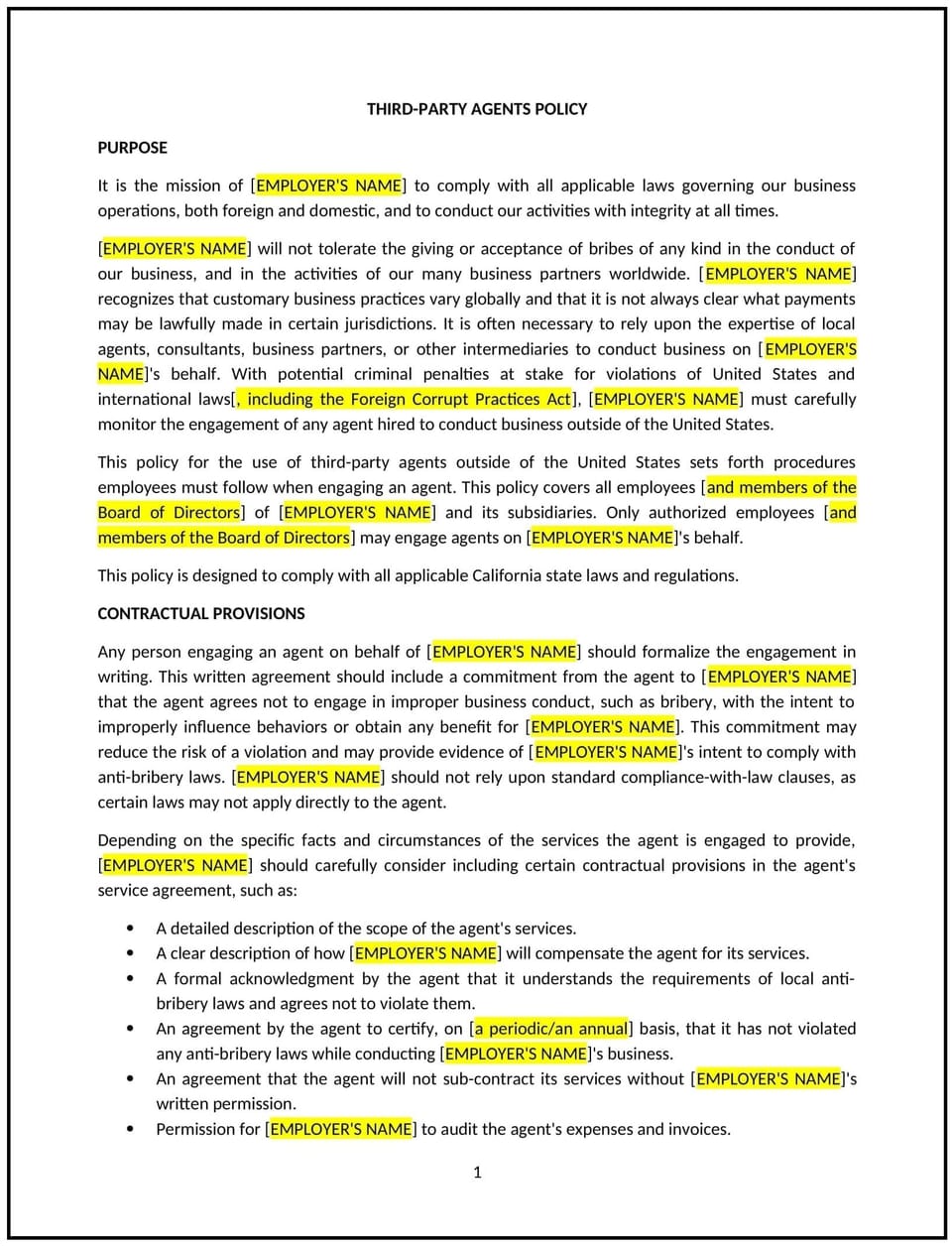Third-party agents policy (California): Free template

Third-party agents policy (California)
In California, a third-party agents policy provides businesses with guidelines for engaging and managing third-party representatives, such as contractors, consultants, and vendors. This policy ensures compliance with California labor laws, such as AB5 (regulating independent contractor classifications), and addresses risks related to third-party conduct.
The policy outlines the expectations for third-party agents, procedures for vetting and monitoring their activities, and safeguards for protecting the business’s interests. By implementing this policy, California businesses can maintain accountability, ensure legal compliance, and minimize risks.
How to use this third-party agents policy (California)
- Define scope: Clearly outline the roles and activities of third-party agents that fall under this policy, including contractors, consultants, and service providers.
- Establish vetting procedures: Require due diligence, such as background checks, qualifications verification, and contract reviews, before engaging third-party agents.
- Communicate expectations: Specify standards of conduct, compliance requirements, and confidentiality obligations for third-party agents.
- Monitor performance: Implement oversight measures to ensure agents meet performance expectations and adhere to agreements.
- Address termination: Provide procedures for ending relationships with third-party agents who fail to meet expectations or violate the policy.
Benefits of using this third-party agents policy (California)
This policy offers several advantages for California businesses:
- Supports compliance: Reflects California labor laws, including AB5, which governs independent contractor classifications.
- Reduces risks: Mitigates potential legal, financial, and reputational risks associated with third-party misconduct or non-compliance.
- Enhances accountability: Clarifies roles and responsibilities for third-party agents, promoting consistent performance.
- Protects business interests: Safeguards confidential information and intellectual property through clear contractual agreements.
- Promotes efficiency: Streamlines processes for vetting, onboarding, and managing third-party agents.
Tips for using this third-party agents policy (California)
- Reflect California-specific laws: Ensure compliance with AB5 and other labor regulations governing independent contractors and third-party agents.
- Use clear contracts: Draft comprehensive agreements outlining the terms of engagement, confidentiality, and compliance requirements.
- Conduct regular reviews: Periodically evaluate third-party agents to ensure continued alignment with the business’s goals and standards.
- Provide training: Educate managers on engaging and monitoring third-party agents effectively and lawfully.
- Update regularly: Revise the policy to reflect changes in California laws or business practices.
Q: How does this policy benefit the business?
A: This policy supports compliance with California labor laws, reduces risks, and ensures third-party agents meet the business’s standards.
Q: What types of agents fall under this policy?
A: The policy applies to contractors, consultants, service providers, and other third-party representatives engaged by the business.
Q: How does this policy support compliance with California laws?
A: The policy reflects California labor laws, including AB5, ensuring lawful classification and management of independent contractors.
Q: What steps should the business take when engaging a new third-party agent?
A: The business should conduct due diligence, draft a clear contract, and ensure the agent agrees to the terms outlined in the policy.
Q: How can the business address issues with a third-party agent?
A: The business can monitor performance, provide feedback, and terminate the relationship if necessary, following the procedures outlined in the policy.
This article contains general legal information and does not contain legal advice. Cobrief is not a law firm or a substitute for an attorney or law firm. The law is complex and changes often. For legal advice, please ask a lawyer.


